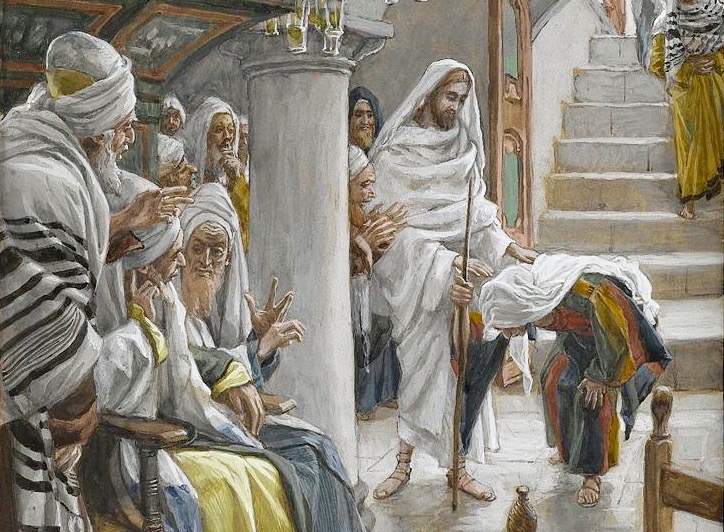Now he was teaching in one of the synagogues on the Sabbath. And there was a woman who had a disabling spirit for eighteen years. She was bent over and could not fully straighten herself. When Jesus saw her, he called her over and said, “Woman, you are freed from your disability.” And he laid his hands on her, and immediately she was made straight, and she glorified God.
Luke 13:10-13

I woke up burdened before I had to wake up. I am burdened by literal stuff—a house to sell, some valuable possessions that may not be worth much anymore, a husband in declining health–and also much self-recrimination (“Why didn’t you move faster on all this?”). I woke up sullen as a rock, impenetrable as clay. I opened my Bible to Luke 13, the reading for today, asking God to speak through the words heard and read so many times before. And here’s what he said:
Woman, you are freed from your burden.
It echoed in my head: not free, the more common usage of the idea behind the word, but freed.
Suppose the word was indeed free, as in, You are free. That’s an adjective, modifying me. It would suggest that I am already in a state of freedom, only my mental hangups keep me from experiencing the sensation of running through sunlit fields (in slo-mo) surrounded by butterflies and rose petals. What’s you problem, girl? Don’t you know all that dead weight you’re carrying is crap that the world (along with relatives, dependents, friends, bosses, etc.) loaded on you? Sweep out all that junk and be who you are—free!
But Jesus didn’t say that. “You are freed,” he said (“set free” in the NIV). Freed is a past participle, indicating action. And not my action. Someone else had to do something to bring it about. This bent woman, that blind man, this dead girl, that demon-possessed boy were all bearing, not just disability, but the widespread consequences of sin. “Satan has kept her bound,” said One who ought to know. And all were freed.
But what happened to their disabilities, their burdens? If “freed” is a verb form rather than an adjective, they had to go somewhere.
Jesus was on his way to Jerusalem when this incident happened. And he was taking all the burdens there.
No one he healed was free from the normal stresses of life or the certainty of death. But all could be freed from the burden of carrying an ever-increasing weight all the way to the grave.
As for me, nothing in my circumstances changed between 4:30 and 7:30 a.m. And yet, I am freed.

Very good!
Wonderful! The Greek verb form in Luke 13:12 is a “perfect”: “you have been set free [or even “loosed from”] your weakness.” It’s more than that the woman’s freedom starts now; Jesus removes her burden all the way back to its root(s). Americans like to think of themselves as “free,” and as largely having freed themselves. In fact, we are only truly freed when “the Son set us free.” Thanks for your insights! The Lord bless and strengthen you as you face the “daily lifting” that is in your road ahead.
Thanks for that Greek insight, Bill. (I’ve forgotten most of the Greek I learned in college.)